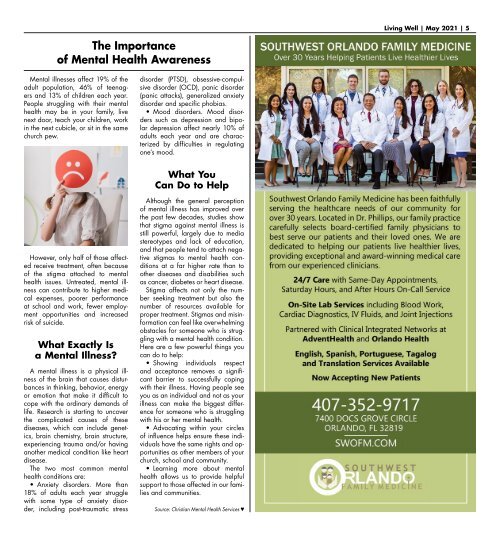050621 SWB DIGITAL EDITION
Create successful ePaper yourself
Turn your PDF publications into a flip-book with our unique Google optimized e-Paper software.
Living Well | May 2021 | 5<br />
The Importance<br />
of Mental Health Awareness<br />
Mental illnesses affect 19% of the<br />
adult population, 46% of teenagers<br />
and 13% of children each year.<br />
People struggling with their mental<br />
health may be in your family, live<br />
next door, teach your children, work<br />
in the next cubicle, or sit in the same<br />
church pew.<br />
disorder (PTSD), obsessive-compulsive<br />
disorder (OCD), panic disorder<br />
(panic attacks), generalized anxiety<br />
disorder and specific phobias.<br />
• Mood disorders. Mood disorders<br />
such as depression and bipolar<br />
depression affect nearly 10% of<br />
adults each year and are characterized<br />
by difficulties in regulating<br />
one’s mood.<br />
What You<br />
Can Do to Help<br />
However, only half of those affected<br />
receive treatment, often because<br />
of the stigma attached to mental<br />
health issues. Untreated, mental illness<br />
can contribute to higher medical<br />
expenses, poorer performance<br />
at school and work, fewer employment<br />
opportunities and increased<br />
risk of suicide.<br />
What Exactly Is<br />
a Mental Illness?<br />
A mental illness is a physical illness<br />
of the brain that causes disturbances<br />
in thinking, behavior, energy<br />
or emotion that make it difficult to<br />
cope with the ordinary demands of<br />
life. Research is starting to uncover<br />
the complicated causes of these<br />
diseases, which can include genetics,<br />
brain chemistry, brain structure,<br />
experiencing trauma and/or having<br />
another medical condition like heart<br />
disease.<br />
The two most common mental<br />
health conditions are:<br />
• Anxiety disorders. More than<br />
18% of adults each year struggle<br />
with some type of anxiety disorder,<br />
including post-traumatic stress<br />
Although the general perception<br />
of mental illness has improved over<br />
the past few decades, studies show<br />
that stigma against mental illness is<br />
still powerful, largely due to media<br />
stereotypes and lack of education,<br />
and that people tend to attach negative<br />
stigmas to mental health conditions<br />
at a far higher rate than to<br />
other diseases and disabilities such<br />
as cancer, diabetes or heart disease.<br />
Stigma affects not only the number<br />
seeking treatment but also the<br />
number of resources available for<br />
proper treatment. Stigmas and misinformation<br />
can feel like overwhelming<br />
obstacles for someone who is struggling<br />
with a mental health condition.<br />
Here are a few powerful things you<br />
can do to help:<br />
• Showing individuals respect<br />
and acceptance removes a significant<br />
barrier to successfully coping<br />
with their illness. Having people see<br />
you as an individual and not as your<br />
illness can make the biggest difference<br />
for someone who is struggling<br />
with his or her mental health.<br />
• Advocating within your circles<br />
of influence helps ensure these individuals<br />
have the same rights and opportunities<br />
as other members of your<br />
church, school and community.<br />
• Learning more about mental<br />
health allows us to provide helpful<br />
support to those affected in our families<br />
and communities.<br />
Source: Christian Mental Health Services ª

















